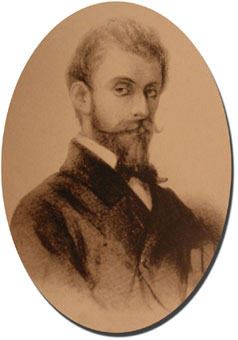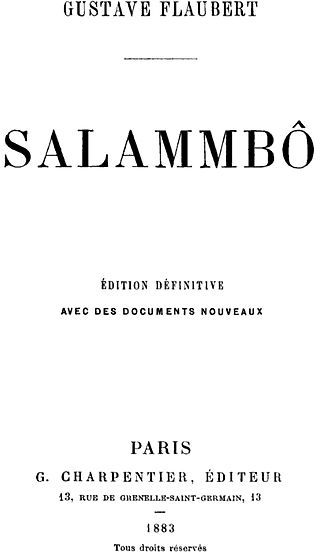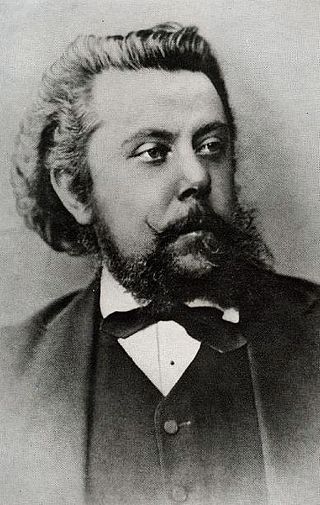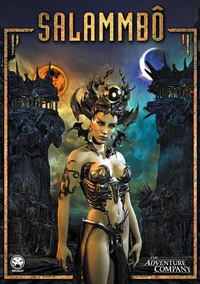
Gustave Flaubert was a French novelist. Highly influential, he has been considered the leading exponent of literary realism in his country. According to the literary theorist Kornelije Kvas, "in Flaubert, realism strives for formal perfection, so the presentation of reality tends to be neutral, emphasizing the values and importance of style as an objective method of presenting reality". He is known especially for his debut novel Madame Bovary (1857), his Correspondence, and his scrupulous devotion to his style and aesthetics. The celebrated short story writer Guy de Maupassant was a protégé of Flaubert.

Louis Étienne Ernest Reyer was a French opera composer and music critic.

Philippe Druillet is a French comics artist and creator, and an innovator in visual design.

Salammbô is an opera in five acts composed by Ernest Reyer to a French libretto by Camille du Locle. It is based on the homonymous novel by Gustave Flaubert (1862). Initially refused by Paris, Reyer's opera enjoyed its first performance at the Théâtre Royal de la Monnaie in Brussels, on 10 February 1890, with sets designed by Pierre Devis and Armand Lynen. The Parisian premiere at the Palais Garnier took place on 16 May 1892 with costumes by Eugène Lacoste and sets by Eugène Carpezat, Auguste Alfred Rubé and Philippe Chaperon, and Amable and Eugène Gardy.

Salammbô (1862) is a historical novel by Gustave Flaubert. It is set in Carthage immediately before and during the Mercenary Revolt. Flaubert's principal source was Book I of the Histories, written by the Greek historian Polybius. The novel was enormously popular when first published and jumpstarted a renewed interest in the history of the Roman Republic's conflict with the North African Phoenician outpost of Carthage.
Post-romanticism or Postromanticism refers to a range of cultural endeavors and attitudes emerging in the late nineteenth and early twentieth centuries, after the period of Romanticism.
Nikolai Semyonovich Golovanov, PAU, was a Soviet conductor and composer, who was married to the soprano Antonina Nezhdanova.

Salammbô [alternative title: The Libyan ] is an unfinished opera in four acts by Modest Mussorgsky. The fragmentary Russian language libretto was written by the composer, and is based on the novel Salammbô (1862) by Gustave Flaubert, but includes verses taken from poems by Vasiliy Zhukovsky, Apollon Maykov, Aleksandr Polezhayev, and other Russian poets.

Salammbô was a projected opera conceived by Russian composer Sergei Rachmaninoff around 1906. It was to be based on Salammbô, a historical novel by Gustave Flaubert. The idea was long thought about, but Rachmaninoff was unable to find a suitable librettist and aborted the idea when his wife and daughter fell ill.

Camille du Locle was a French theatre manager and a librettist. He was born in Orange, France. From 1862 he served as assistant to his father-in-law, Émile Perrin, at the Paris Opéra. From 1870, he was co-director at the Opéra-Comique with Adolphe de Leuven, and sole director from 1874 to 1876. He is best remembered for mounting the original production of Bizet's Carmen in 1875.

Salammbo: Battle for Carthage is a first-person perspective adventure video game. It began development at Cryo Interactive, but the company went bankrupt during production. The Salammbo team was ultimately acquired by DreamCatcher Interactive, which finished the game's development.
Vyacheslav Lavrent'yevich Nagovitsin is a Russian composer born in Magnitogorsk. He was a student of Dmitri Shostakovich at the Leningrad Conservatory that he graduated in 1966. In 1963-1964 he worked in Ulan-Ude Opera and Ballet Theater. In 1966-1970 he was a lecturer at the Mussorgsky Music School in Leningrad. In 1968-1970 he also worked as the Music Director of the Leningrad Comedy Theatre. Since 1970 he became a professor at the Leningrad Conservatory. He orchestrated two unfinished operas of Modest Mussorgsky: Zhenitba and Salammbô. His orchestration of Salammbô was used by Valery Gergiev at the Mérida festival in 1991.
Naravas was a Numidian chief in the Mercenary War of the Carthaginian state. Naravas is the Greek form of Narbal or Naarbaal.
Marriage is a socially or ritually recognized union, or legal contract between spouses.
Hannibal was a Carthaginian general who took part in the Mercenary War between Carthage and rebelling mercenaries.
Lyudmila Stepanivna Shemchuk is a Ukrainian operatic mezzo-soprano. She is an Honoured Artist of the RSFSR (1984).
Paul Gondard (1884–1953) was a French sculptor.

The Loves of Salammbo is a 1960 historical drama directed by Sergio Grieco. It is loosely based on the novel Salammbô by Gustave Flaubert.
Georges de Saint-Foix was a French musicologist, connoisseur of Mozart and specialist of the 19th century and the beginning of the 20th century.
This page is based on this
Wikipedia article Text is available under the
CC BY-SA 4.0 license; additional terms may apply.
Images, videos and audio are available under their respective licenses.









